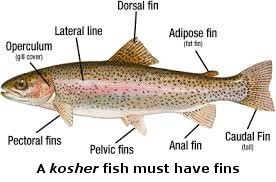The Bible states that “This may you eat of all that is in the waters: everything that has fins and scales, you may eat. But anything that has no fins and scales, you may not eat.”
The Talmud states: “All [fish] that have scales also have fins [and are thus kosher]; but there are [fish] that have fins but do not have scales [and are thus unkosher].”
This raises two questions. First, why are fins and scales the characteristics that distinguish kosher fish? Second, as the Talmud itself asks, why are fins presented as an identifying sign for kosher fish when they are redundant, since scaled fish inevitably have fins as well?
The Kabbalah teaches that the physical attributes of fish, and of all animals, reflect their psychological and spiritual qualities. It further explains that the food a person consumes has a profound effect on his or her psyche. Therefore, when one eats the flesh of a particular creature, the “personality” of that creature affects the person in some way.
As the armor that protects the body of the fish, scales represent the quality of integrity, which protects us from the many pitfalls that life presents. A man of integrity will not deceive his customers, in spite of the financial profits involved. He will not lie to a friend, despite the short-term gain from doing so. Integrity means that one has absolute standards of right and wrong and is committed to a morality that transcends one’s moods and desires.
Fins, the wing-like organs that propel fish forward, represent ambition. A healthy sense of ambition, knowing one’s strengths and wanting to utilize them in full, gives a person the impetus to traverse the turbulent sea of life and to maximize his or her G‑d-given potential. It propels us to fulfill our dreams and leave our unique imprint on the world.
Which of these two qualities is more important to cultivate in life—fins or scales? What ought to be the main function of education?
Should we concentrate primarily on providing our children with the confidence and skills necessary for them to become accomplished human beings? Or ought we to focus more on raising children with principles, teaching them that it is more important to do right than it is to do well? Are the two equally significant?
The Talmud teaches that all fish that have scales also have fins, but that there are fish that have fins but no scales, and that such fish are not kosher. Symbolically, this means that a human being who possesses ambition but lacks integrity is “unkosher.” Such a person may be full of confidence, driven to make an impact on society. Yet educating ambitious and confident children does not guarantee their moral health.
On the other hand, the Talmud tells us that all fish with scales have fins. While integrity is fundamental, ambition is also important. By mentioning fins as one of the signs of a kosher fish, the Torah teaches us that it is not enough to maintain our own integrity; we must also have a positive effect on the world. The lesson of the Talmud is that if we teach our children to approach life with awe before truth, with an unyielding commitment to serve a transcendent, moral G‑d, they will certainly succeed and develop “fins” as well. Regardless of their other abilities, they will find the drive to improve themselves and to make the world a better place.

